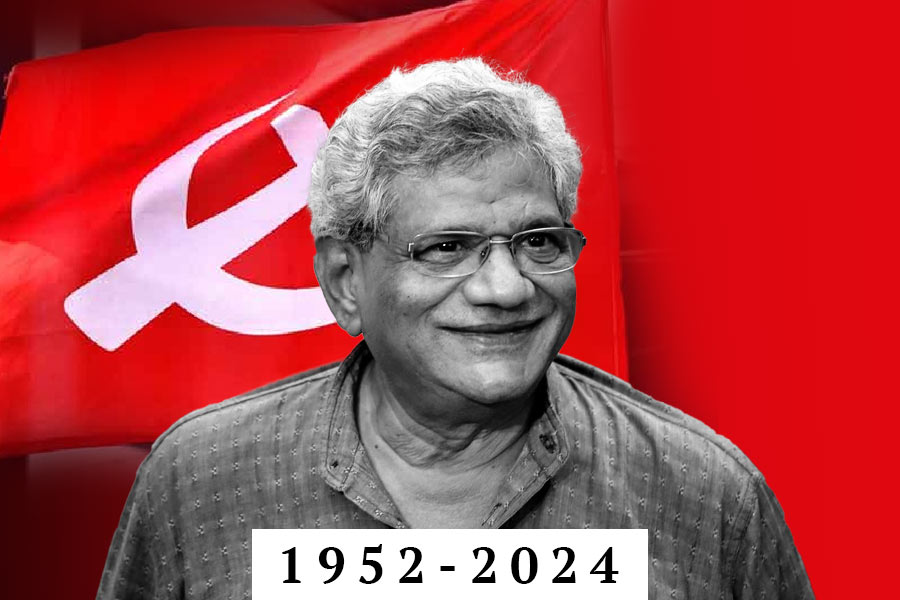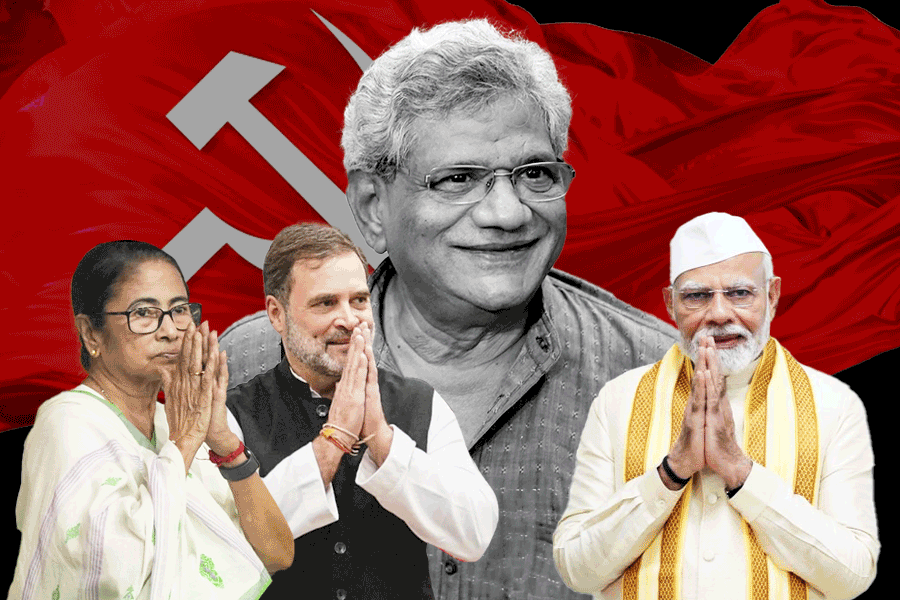Sitaram Yechury, the fifth general secretary of the Communist Party of India (Marxist), had once commented, he would never retire from politics.
The 72-year-old Yechury kept his word as he breathed his last on Thursday afternoon at the All India Institute of Medical Sciences where he was wheeled in following a chest infection on August 19. Since then his condition deteriorated.
Sometime in the 1990s, Sitaram Yechury, along with his long-time comrade Prakash Karat, was described as one of the "young and upwardly mobile Marxist intellectuals", in short "Yummies".
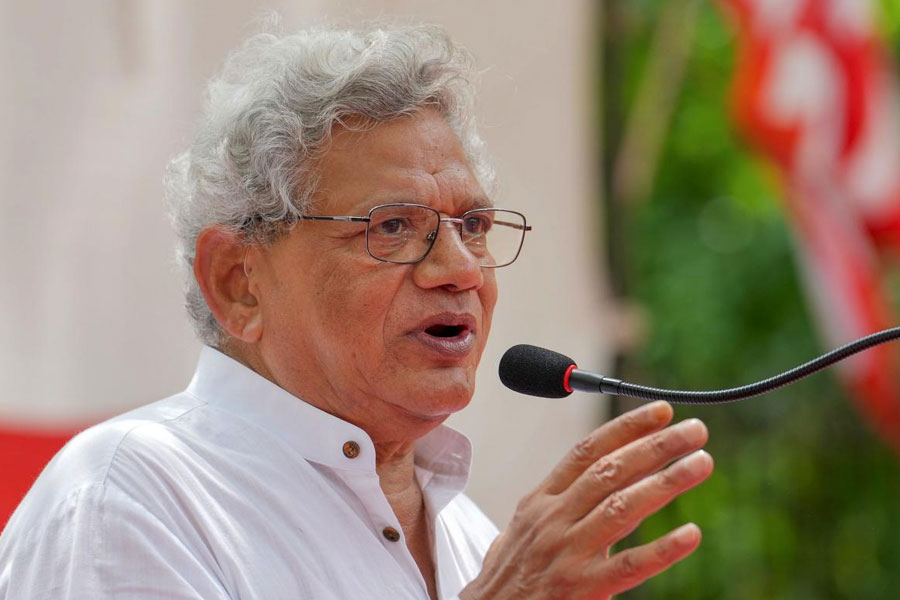
CPI(M) General Secretary Sitaram Yechury in New Delhi, on August 7. File picture.
Those were the days of the mili-juli sarkars – however shortlived – in Indian politics. That was when the late Marxist leader and then CPM general secretary, Harkishen Singh Surjeet, was parleying with socialists of various kinds and even those outside the larger socialist fraternity to keep both the Congress and the BJP out of power.
Alongside Surjeet was a young Yechury, already a member of the party’s highest decision making body, the central committee, for over a decade, despite not having led any district or state unit. The late EMS Namboodiripad had played a key role in giving Yechury the push to join the party, while he was still in his 20s.
Yechury was the CPM’s leading intellectual, editing the party mouthpiece People’s Democracy for over two decades and going on to author several books, while tiptoeing the minefield of building up a wider coalition of political parties committed to the idea of secularism and democracy, despite the apparent contradictions within such a formation, like the CPM and the Congress in Kerala, the AAP and Congress in Punjab and the Trinamul and CPM-Congress in Bengal. He was especially active ahead of the last general elections of this summer.
Fluent in Hindi, Telugu, Tamil as well as Bengali and English, Yechury was as much comfortable in addressing party cadres as well as while mingling in socialite gatherings and meeting those from across the political divide, unlike the hardliner Karat.
In that sense he was the true and possibly the last student of the school of Marxist politicians like the late Jyoti Basu and Harkishen Singh Surjeet, masters in the art of coalition politics.
When he took over as the CPM’s fifth general secretary, some of his own party comrades were sceptical of Yechury’s proximity to the Congress, especially the Gandhis. One such comrade had remarked in Vishakhapatnam that Congress would be the future of the CPM.
Congress leader Jairam Ramesh had once taken a dig at Yechury calling him the “general secretary" for both the Congress and the CPM. “And sometimes, his influence in the Congress is more than in the CPM.”
Many in the Congress and CPM would whisper about Yechury’s increasing influence on Congress leader Rahul Gandhi, which left another key ally, Mamata Banerjee, livid.
For Yechury, the journey could not have been an easy one.
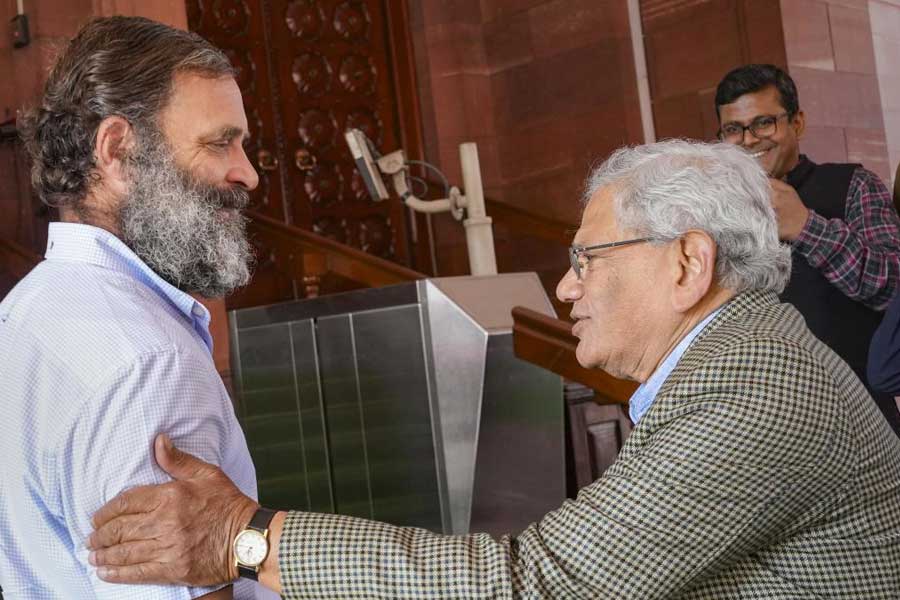
Congress MP Rahul Gandhi and CPI (M) General Secretary Sitaram Yechury at Parliament House complex during Budget Session, in New Delhi on February 7, 2023. File picture.
When Indira Gandhi imposed the Emergency in 1975, Yechury hid in a hospital room where his father, an engineer and orthodox Brahmin, was in convalescence post-surgery. Though he was arrested later, he slipped through the cracks on a technical flaw and fled to Kurnool in Andhra Pradesh. Despite family pressure Yechury remained committed to his ideology.
Yechury cut his teeth in politics as a student in JNU where he met Karat, a fellow ideological traveler, though lightyears apart in temperament. Their differences on several issues came out in the open. Like in 1996 when Yechury was among those who favoured Jyoti Basu as the next Prime Minister of India. More than a decade later when the CPM-Congress ties hit rock-bottom over the Indo-US nuclear deal, Yechury had tried a compromise formula that was agreeable to the Congress as well, but Karat, then general secretary of the party, would not budge from his stand.
With the electoral decimation of the CPM in more than a decade, Yechury’s skills as a negotiator, something he had picked up working under Surjeet during the days of the United Front and the UPA-I, faded from public memory.
In the early 1970s, as a student of economics in Delhi University’s St Stephen’s, Yechury had removed his sacred thread and hung it on a clothes hanger in his hostel room. Years later, as the general secretary of a party that many feel belongs to the age of dinosaurs, he spoke of integrating the “classical Marxist analysis of struggle against economic exploitation with the India-specific condition of social oppression”. Yechury was talking about the elephant in the room for the Indian Marxists, the caste system. The Marxists had never been comfortable with the caste question. Yechury raised the “Neel Salaam, Lal Salaam” slogan in his speeches.
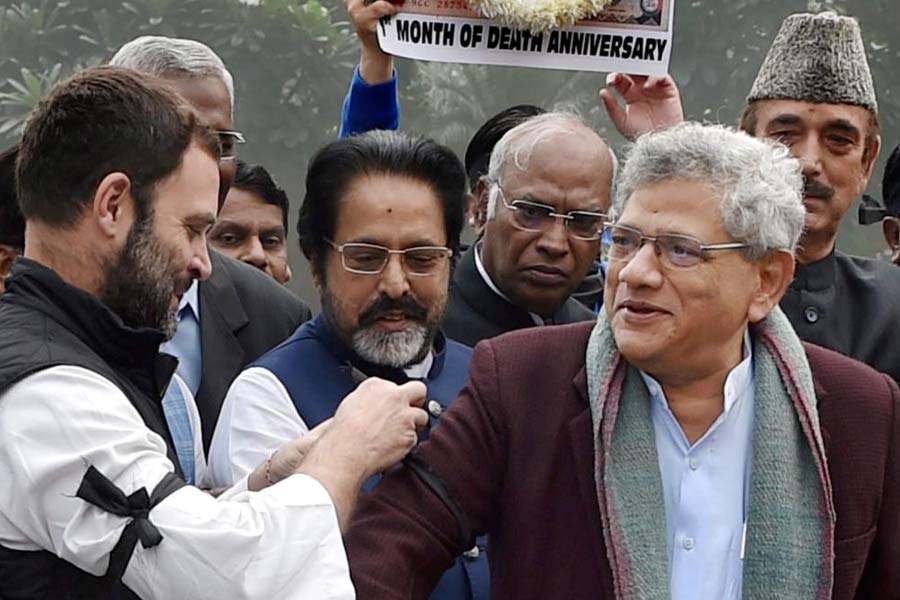
Congress leader Rahul Gandhi ties a black ribbon to CPI (M) leader Sitaram Yechuri during a protest at the Parliament House, in New Delhi on December 8, 2016. File picture.
As a Rajya Sabha MP, representing Bengal for two successive terms, Yechury’s participation in House debates earned him the respect of political rivals like the late Arun Jaitley. The two had known each other since their days as student leaders in Delhi University, despite their lifelong commitment to political ideologies that are polar opposites.
He was pragmatic enough to admit that the withdrawal of support to the Congress over the nuke deal was another “historical blunder” and paved the way for the Congress and the Trinamul to come together in Bengal, a blow from which the CPM is unlikely to recover.
While he accepted the necessity of the CPM and the Congress to come together in Bengal, yet he could not bring himself to share the dais with state Congress leader Adhir Chowdhury during an election rally in 2016. Yechury smoked sitting inside a car waiting for Chowdhury to finish his speech and leave.
How exactly India will remember Yechury in the changed socio-political contours is unknown.
An enduring image of Yechury that resurfaced in the age of social media was of his reading out a memorandum while Indira Gandhi listened patiently.
On the eve of the 49th anniversary of the Emergency, Yechury himself narrated the story.
“She had lost the elections but remained as the chancellor. We said this cannot continue because of the Emergency and excesses committed. We wrote a four-page chargesheet and with all the students went to her residence at Willingdon Crescent. During the Emergency arrest warrants were pasted on the doors of the hostel rooms (in JNU) for students who were in hiding. We wanted to paste the memorandum at her door. When we reached, VC Shukla asked us, what is this? I told him we have come to give her this memorandum. He went inside and on coming out a little later, said only five could come. I said no. All the students will enter. He went inside again. This time we saw Madam Gandhi was approaching the gate. Everybody was surprised. She asked what was this about? I told her I am the president of the JNU Students’ Union and we have come to hand over this memorandum. There was no police bandobast. I told her we want you to resign as chancellor. It will not be correct for you to continue. She asked me to read out the memorandum. We were in a fix as the memorandum had a lot of gaalis (abuses). I read it. She heard all of it with a constant smile on her face.”
Indira Gandhi did step down as chancellor of JNU.

